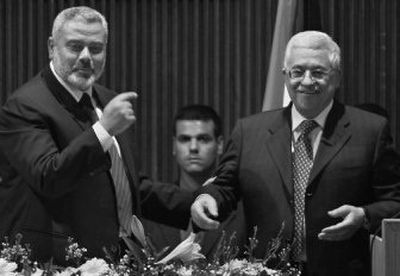Vote puts end to Hamas rule

JERUSALEM – A power-sharing deal by rival factions won the approval of the Palestinian Parliament on Saturday, ending a year of one-party rule by the militant Hamas movement and producing the first crack in an international aid embargo against the Palestinian Authority.
Moments after the Palestinian Legislative Council’s vote of confidence, Norway recognized the new coalition government and said it was restoring political and economic ties. They were cut off after Hamas came to power last year and refused to renounce calls for Israel’s destruction.
Norway’s left-of-center government became the first to break with an international boycott led by the United States and European Union, and its announcement raised expectations that other European countries would follow suit. Norway is not an EU member but has long been an active player in Middle East diplomacy and a contributor to the Palestinian Authority.
Members of the Palestinian Parliament jumped to a standing ovation after giving the coalition of Hamas, its more moderate rival Fatah and some smaller parties an 83-to-3 vote of confidence after two hours of debate. Later, Palestinian President Mahmoud Abbas swore in the 25-member Cabinet.
The power-sharing accord, aimed at ending the embargo and months of deadly fighting between Hamas and Fatah gunmen, embodied conflicting stances toward Israel that were starkly evident in speeches to the video-linked session of lawmakers in the West Bank and Gaza Strip.
“We reject all forms of violence,” Abbas, the Fatah leader, declared as he opened the session at Parliament headquarters in Gaza City. “We extend our hand once more to reach a settlement (with Israel) that will give future generations a hope of peaceful coexistence.”
Following him to the lectern, Prime Minister Ismail Haniyeh of Hamas spelled out a new government program that called for extending a 4-month-old truce with Israel in Gaza to the West Bank. But he yielded no ground on Hamas’ founding principle of hostility to the Jewish state.
“The government affirms that resistance in all its forms to the occupation is a legitimate right,” said Haniyeh, who retained his position at the head of the government. “It is the right of our people to defend itself in the face of continuing Israeli aggression.”
Despite Hamas’ unbending ideology and dominant role in the coalition, some Western nations have indicated a willingness to give the new government a chance.
After Hamas won elections last year, the United States, the European Union, Russia and the United Nations – the Quartet of Middle East mediators – jointly backed an embargo, saying it would be lifted only if the Palestinian government recognized Israel, renounced violence and accepted previous Arab-Israeli peace agreements.
Hamas’ only concessions in the program announced Saturday were a declaration that the government would respect those peace accords and the addition of the words “especially nonviolent resistance” to the sentence in the program about resisting Israeli occupation by any means.
Abbas says he has brought the government closer to meeting international demands. He argues that only he, as head of the Palestine Liberation Organization, is empowered to negotiate with Israel and because any peace accord would be submitted to Palestinian voters for approval in a referendum.
Israeli officials cited Haniyeh’s remarks Saturday to reaffirm their refusal to work with his new government, even as they continue, with U.S. endorsement, to hold talks with Abbas.
Israeli Vice Premier Shimon Peres asked on Israel Radio: “If this is a government that does not renounce terror, why should it be helped?”
International opposition to the Palestinian government began eroding after the power-sharing accord was sealed last month during negotiations in Saudi Arabia.
The EU and the United Nations welcomed the new government but said a resumption of aid would depend on an assessment of its actions.